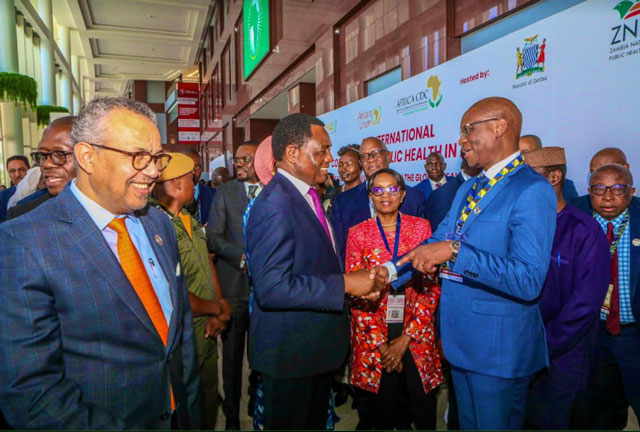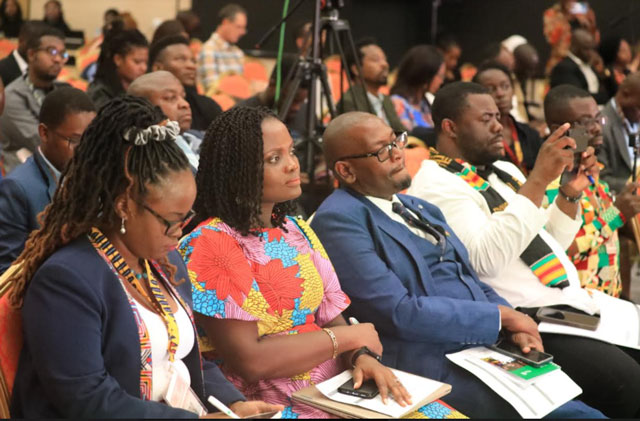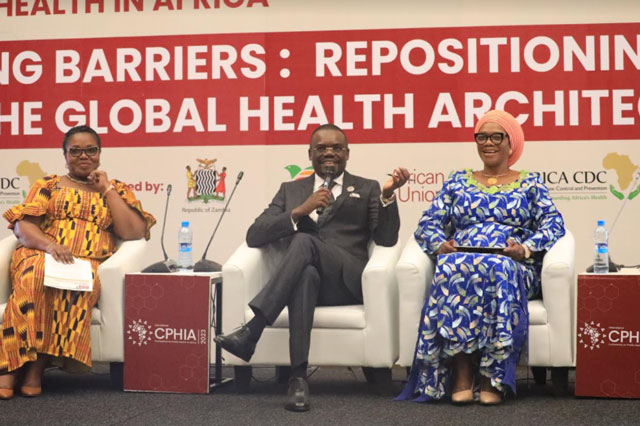
Lusaka, Zambia | RONALD MUSOKE | President Hakainde Hichilema of Zambia has rallied the continent to collaborate more if it is to build more resilient health systems that are able to effectively deal with the disease burden that the continent continues to grapple with.
“Public health and other health aspects require us to work in unison. The thing about health, and COVID-19 taught us the hard way, is that there is no territorial ground (for diseases).”
“You can’t say this is my area and will do it my way,” President Hichilema told over 5,000 delegates during the opening session of the 3rd International Conference on Public Health held Nov.27-30 at the Mulungushi International Conference in Lusaka, Zambia.
The conference, the second biggest in the world after the World Health Organization Assembly, was held under the theme, “Breaking Barriers: Repositioning Africa in the Global Health Architecture.” It brought together researchers, policymakers, health ministers, among others, from Africa and the entire world to share scientific findings and collaborate on research in the continent’s quest to improve the health security of the continent’s 1.4 billion people.
In the opening session attended by Dr. Tedros Adhanom Ghebreyesus, the World Health Organization Director General; Saara Kuugongelwa, the Prime Minister of Namibia;as well as Dr. Jean Kaseya, the Director General of the Africa Centres for Disease Control and Prevention; President Hichilema emphasised the importance of collaboration and leadership at all levels of the health system in Africa.
The Zambian leader said African presidents have since agreed to work together to ensure that the continent gets the best of vaccines and other medical commodities to avoid what happened during the COVID-19 period when the continent was left behind in receiving vaccines. He said it was time Africa started moving with the rest of the world even in areas of vaccine production and expressed happiness that some countries have already started manufacturing vaccines.
According to the Zambian President, COVID-19 taught African countries lessons on the importance of working together.He also called for robust investments in health systems. However, Hichilema said prudent utilization of resources in the health sector and the need to invest in areas that will ensure effective health delivery will equally be key.


Infectious diseases continue to wreak havoc in Africa
The importance of the conference was underscored by news of several disease outbreaks that close to 18 African countries are currently battling with, according to the Africa CDC. For instance, cholera outbreaks have been reported in 18 countries with over 4000 fatalities reported in those countries. Dengue Fever is also wreaking havoc in the Sahel while in Zambia, Sylivia Maseko, Zambia’s Minister of Health, confirmed a recent Anthrax outbreak that has since escaped from animals into humans.
On his part, Dr. Jean Kaseya, the Director General of the Africa Centres for Disease Control and Prevention (Africa CDC), an autonomous continental agency that is mandated with strengthening the capacity of African countries to respond quickly and effectively to disease threat, said “the theme for this year’s conference calls on African countries to start thinking beyond traditional health systems.”
He said it was important for African countries to harness technology, embrace equity and social justice and foster principles of collaboration. “It challenges us to look at issues that have hindered Africa’s progress in public health. It calls upon us to redefine our position in the global health architecture,” he said.
Dr. Kaseya said there is also need for African countries to break the barriers that have hindered progress in the health sector and forge a new public health order which will be resilient, equitable and meet the challenges of the future.
“By (for instance) leveraging the digital advancements, including artificial intelligence, we can enhance our ability to detect health threats and prevent a crisis,” he said. The Africa CDC, he noted, is now advocating for an ambitious agenda that aims to ensure that by 2040, a minimum of 60% of vaccines and medicines used in Africa are manufactured within the continent.”
Among several themes discussed during the conference included; how to prepare for pandemics and create resilient financing mechanisms in Africa; fostering African-led innovation in order to advance local production of vaccines, diagnostics and therapeutics; delivering universal health coverage in Africa (strengthening equitable health systems); accessing adequate health care for young girls and women in Africa; safeguarding Africa’s health security (health emergencies, bio-security, climate change and multi-sectoral response mechanisms; transforming health in Africa through digital innovation; whole of society approach to public health (the power of engaging civil society, the private sector and local philanthropy) as well as combating infectious diseases, neglected tropical diseases and antimicrobial resistance in Africa, and unmasking the silent epidemics (Non Communicable Diseases, mental health and injuries).
 The Independent Uganda: You get the Truth we Pay the Price
The Independent Uganda: You get the Truth we Pay the Price






Health facilities in Africa should be more funded.
This article is in fact a nice one it assists new the web viewers, who are wishing in favor of blogging.